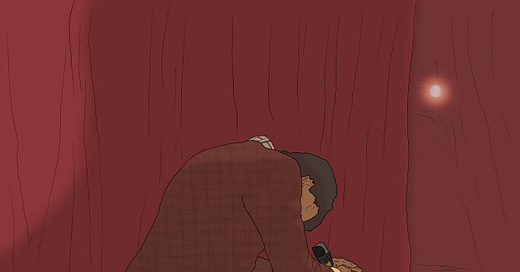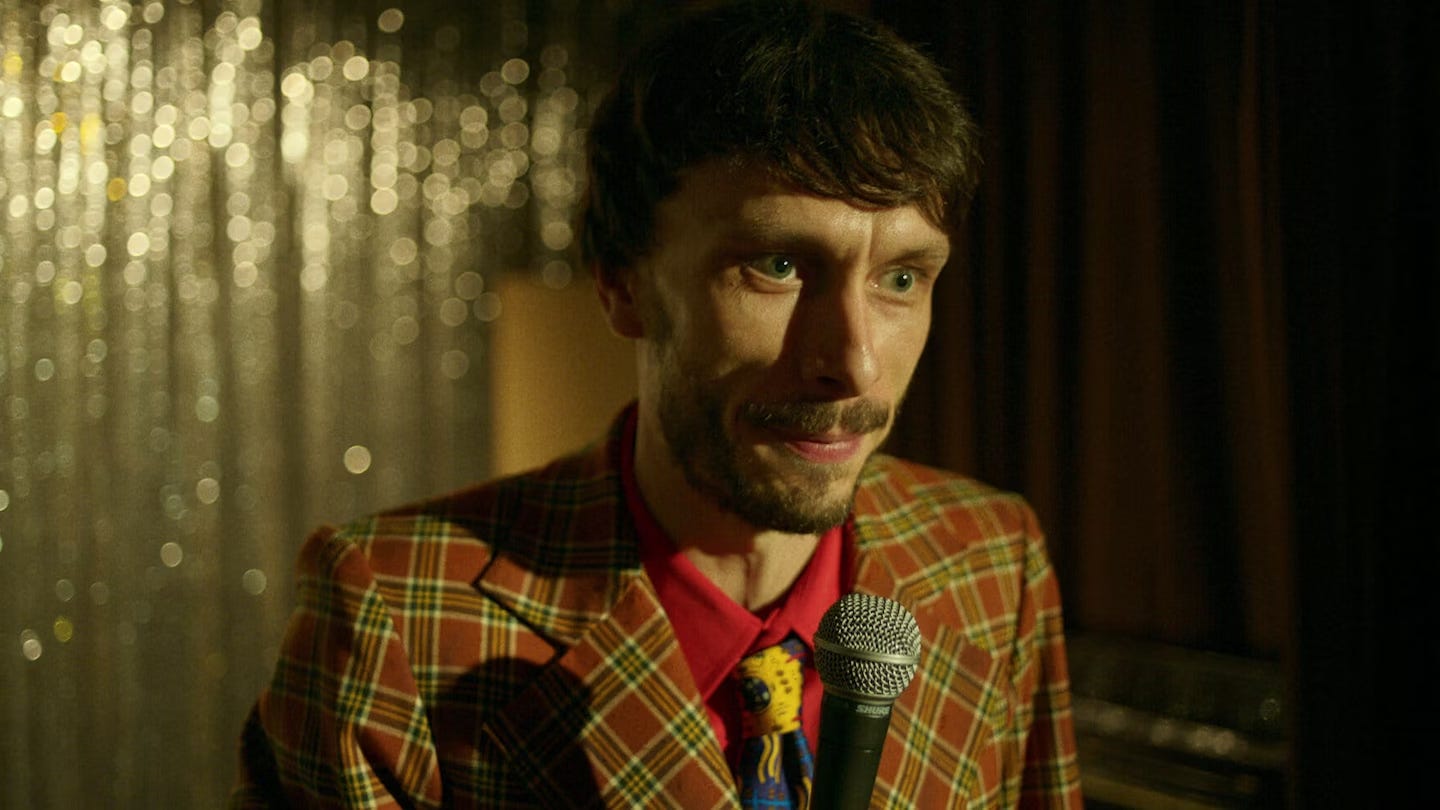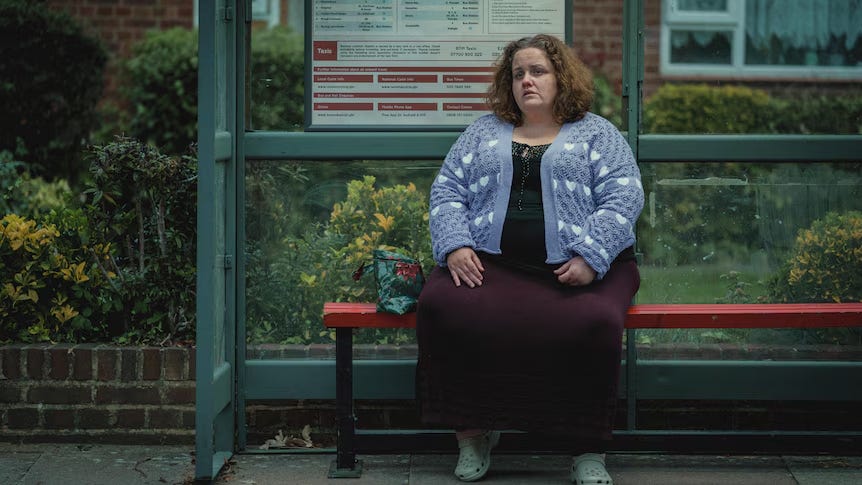Review: Sent From My iPhone
Richard Gadd’s ‘Baby Reindeer’ and the dichotomy between justice and healing
The Yearning Rating: ✰✰✰½
Romance: ✰
Sex:
Storytelling: ✰✰✰✰
Performance: ✰✰✰✰½
Yearning: ✰✰✰✰✰
Scroll down for a recap of SPRING CLEANING and a link to pictures from the event, courtesy of the fantastic Dierdre Alston!
Trigger warning for sexual abuse and stalking. Spoilers ahead.
Written by Ali Romig
When my friends told me to watch Netflix’s new sleeper-hit, Baby Reindeer—a limited series about a down-on-his-luck comedian and his stalker of two years—the word that came up again and again was “unexpected”. What they meant was, this show is nothing like the indecently raunchy Fatal Attraction, nothing like the frustratingly dogged Obsessed, or any other one-note depiction of unrequited female obsession we’ve previously been fed. Instead, what starts as a fairly played-out story—a man is kind to a sad, lonely woman and soon regrets it—quickly twists and turns into something rawer and harder to chew on. Rather than unfolding like the kind of psycho-thriller you might binge in one sitting, Baby Reindeer is a slow, heavy watch—much more in the vein of Michela Cole’s groundbreaking series, I May Destroy You. It’s less about a stalker, and more about the insidiousness of unprocessed trauma, the limits of empathy, and the false equivalency of justice and healing.
Baby Reindeer is chock-full of surprises. And while this can make for good television, I genuinely wish I’d been prepared for some of them, because they are uncomfortable and emotionally demanding. That said, I am going to be discussing the show as a whole—so if you’re someone who doesn’t like spoilers (no matter what they are) then this is your cue to come back after you’ve watched.
The series follows Richard Gadd’s Donny, a failing comedian and bartender, who, one day, takes pity on a crying customer and offers her a cup of tea on the house. The customer—Martha (Jessica Gunning), a middle-aged “lawyer”—quickly develops an attachment to Donny, who she refers to as her “baby reindeer”. This fondness later becomes an all-out obsession. She shows up every day at the pub where he works, sends him countless emails, follows him home and sits outside of his house for hours on end, heckles him at his comedy gigs, and eventually begins to provoke and attack his family and loved ones. Even with this foundation, we pretty quickly understand that this won’t be your average “stalker” story.
In the second episode, after receiving a Facebook friend request from Martha, Donny looks her up and discovers that she has a well-documented history of harassing people. Still, he accepts the request. Donny continues to humor Martha, even as her behavior becomes more and more alarming. Theirs is a serpentine relationship, at once both volatile and intensely private. Every once in a while it even borders on strangely tender. It isn’t until Donny eventually goes to the police to report Martha that we learn of the context surrounding his self-destructive impulses. As he turns her in, he relives the time in his life years prior when he was drugged and sexually assaulted by an older, established man in the comedy industry. These scenes are brutal, direct, and incredibly difficult to stomach. From here, Donny tries to outrun the emotional fallout from both of these instances—the stalking and abuse—even as it becomes increasingly clear that all of it is profoundly intertwined.
Baby Reindeer is based on Gadd’s stage show of the same name, which was drawn from his own life. The U.K. native has been outspoken about his personal experiences with both a stalker and industry abuse. This is likely why Gadd’s character Donny is so brutally realized. While it’s never a question that Donny is the victim of horrendous circumstances, Gadd does lean into the character’s less-than-sympathetic qualities to create a distinctive portrayal of someone suffering from unprocessed trauma. I found this refreshingly human, as most of the time these kinds of stories get flattened for consistency’s sake—as if the only kind of victim worth understanding is an exemplary one.
One of the most unexpected aspects of the series—is it being buried in the marketing, or is it just me?—is Donny’s eventual coming out. Baby Reindeer unspools this queer plotline with a surprising amount of delicacy. When we first meet Donny he is dating Teri (Nava Mau), a trans woman and therapist who he is lying to about his job and name. While a part of me still firmly believes that Teri should have run in the other direction much sooner—because c’mon, she could do a lot better—I did appreciate that Gadd was able to realistically write their evolving relationship with layers of safety, shame, desire, confusion, and playfulness without ever going so far as to cosign Donny’s behavior. Outside of Donny and Teri’s relationship, Gadd also creates an atmosphere that subtly, yet effectively illustrates just how suffocating compulsory heterosexuality can be. No one in Donny’s life (at least that we see) is outright telling him that he can’t be bi, or threatening him to stay closeted. Instead, he simply exists in an overwhelmingly patriarchal world, much like all of us. His father and coworkers all uphold their heterosexuality in ways they don’t think twice about, but that leaves Donny feeling paralyzed with a shame both visceral and hard to pinpoint, because it’s that ingrained.
Of course, Donny’s shame is twofold. For a long time, Donny’s sexual encounters with both men and women were in direct response to the horrific abuse he suffered at the hands of an older man—an attempt to either regain control, or lose it so completely that it no longer mattered. So when offered tenderness from Teri, it makes sense that Donny would be confused as to how this kind of love could fit into the idea of sex he’d come to rely on for self-preservation. Baby Reindeer isn’t afraid to confront uncomfortable contradictions head on, and Donny’s journey to self-actualization is a great example of that.
I’d be remiss not to talk about Jessica Gunning as Martha. I have to be honest, when I first started Baby Reindeer and saw a plus-size actress cast as the “crazy stalker”, I was worried that this show would fall into an all too familiar pattern of devaluing fat characters. But I was relieved and thrilled to see Gunning infuse a complicated character with a refreshing amount of nuance. She’s able to play the big moments up without ever abandoning the character’s humanity, and in Martha’s softer moments, Gunning is truly heartbreaking in her portrayal of a woman trapped in the fantasy of her own mind.
I think the show does an incredible job of highlighting the way our perspective informs how sane or insane we consider an action. To be clear, Martha’s actions are objectively horrible—not only does she harass Donny, but she also attacks Teri and spews racist, transphobic hate at her. But the show weaves in similar actions on Donny’s part with such a light hand that you could blink and miss just how questionable and concerning they are. At one point, he follows Martha home and watches her through a window. There are quick shots of him shooting off an endless thread of texts to someone—all unreturned. And later, we see him sit outside Teri’s house watching her with a new beau.
Because we’ve been following Donny for episodes on end, connecting with him, we understand the context surrounding these choices. This doesn’t necessarily excuse them, but it does prime us to accept them. At the end of the series, Donny sits in a bar, listening to an old, previously unplayed voicemail from Martha. In it, she describes her difficult childhood, and how her only source of comfort was her baby reindeer stuffed animal. Donny begins to cry and the bartender offers him a drink on the house, bringing the story full circle and connecting Donny directly to Martha. Baby Reindeer isn’t so much equating their behavior as showing us that the line between sanity and delusion isn’t as thick as we think and that in a world that wounds and isolates us, maybe it wouldn’t take much to push us over the edge.
In the end, I think what Baby Reindeer does best is challenge the illusion that what it takes for you to move through and past something will be in any way tied to fairness or legal vindication. Even though the show ends with Martha behind bars, this doesn’t spell closure for Donny, who remains haunted by his experiences and unable to let them go. It’s a messy place to end a series, but an honest one. And in my opinion, extremely brave.
You can stream Baby Reindeer on Netflix.
Spring has been cleaned!
To all those who attended our event with Sapph-Lit last weekend, thank you! We had an incredible time at Farm to People celebrating sapphic books and film. If you discovered us through the party, we hope you’ll stick around and give us the chance to sweep you off your feet <3
The event was photographed by Deirdra Alston, and you can access the album and download photos here! If you share them on Instagram, please tag @theyearningnewsletter, @Sapph-Lit, and @deirdrasinternet :)
And there is still time to use code YEARNINGFORFOOD for a free small produce box or $25 off any of Farm to People’s farm boxes!














